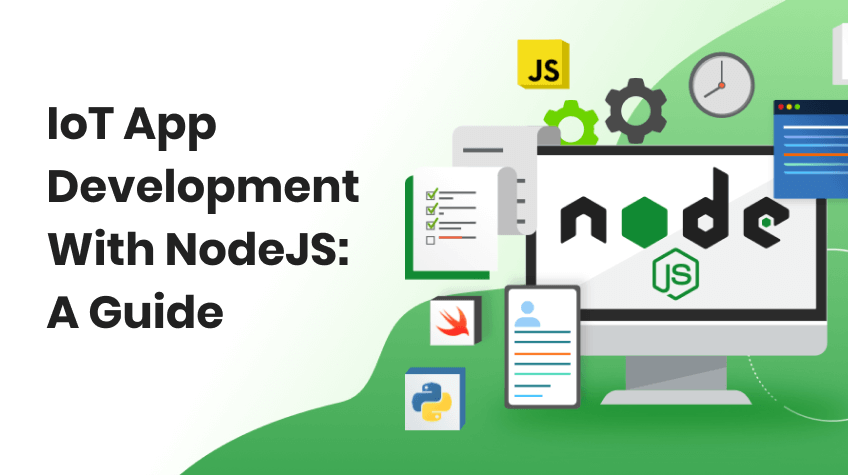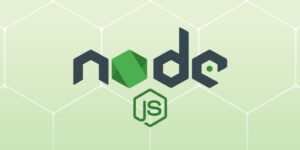
Do you want to develop an IoT app? If the answer is yes, the main choice for this is NodeJS. In the recent times application of IoT app development has grown a lot as it has become an industry 4.0 mega trend. Following this, majority of the modern tech driven industries adopted to this trend, using NodeJS technology.
But what is the relation between these two technology? How do they work together? Why choose NodeJS for IoT app development? Well, we shall be answering all of these questions in this blog.
Therefore, with this being said, let’s get right into it, starting with an introduction to IoT.
Introduction to IoT
Before we hire NodeJS developer and create an IoT app, let’s take an overview of Internet of the thing technology.
So, can you imagine a world where your refrigerator tells your grocery list what’s missing, and your thermostat talks to your smart blinds to create the perfect ambience?
That’s not a far-fetched future concept, rather something we are capable of right now, with the magic of IoT.
In the simplest terms, IoT is like having a digital orchestra where devices play together to make your life more convenient.
From smart homes to connected cities, IoT is weaving a web that transforms the way we live, and we’re here to demystify its wonders.
Moving on, let’s move to next section.
Role of NodeJs in IoT App Development
A lot of you might be asking, what’s the role of a NodeJS development company in IoT development?
Well, It’s a runtime environment built on JavaScript that boasts speed, scalability, and real-time capabilities.
But why is it the perfect match for IoT?
NodeJS operates on an event-driven, non-blocking architecture, making it ideal for handling multiple tasks simultaneously without causing bottlenecks.
In the fast-paced world of IoT, where data flows like a river, NodeJS stands out as the go-to choice for app developers. It’s like having a multitasking genius that effortlessly manages the communication between devices.
And now, it’s time to look at the benefits of NodeJS for IoT app development.
Benefits of Using NodeJS for IoT app development
Why to use NodeJS for IoT app development, you ask?
Well, it’s not just because it’s the cool kid on the block. But, NodeJS offers some impressive perks for IoT app development:
- Ease of Learning: NodeJS is beginner-friendly. If you’ve dabbled in JavaScript, you’re already halfway there. Its familiarity reduces the learning curve, allowing you to jump into IoT development with confidence.
- Scalability: NodeJS can handle a colossal number of connections concurrently. In the IoT landscape, where devices chatter constantly, NodeJS ensures that the conversation flows seamlessly, keeping your smart devices in perfect harmony.
- Rich Module Library: NodeJS comes with a treasure trove of modules. These pre-built components act like LEGO blocks, saving you time and effort in crafting your application. Why start from scratch when you can build upon the brilliance of others?
Steps to Build IoT App With NodeJS
It’s time to build an IoT app with NodeJs technology.
In this section of the blog, we shall be discussing each step involved to develop IoT app with NodeJS. Therefore, let’s get right into it.
1. Get Your Tools Ready
- Install NodeJS: Head to the NodeJS website, download the latest version, and follow the installation instructions.
- Choose an IDE: Select a code editor, like Visual Studio Code, for a smooth development experience.
2. Setting Up Your Project
- Create a new project folder: Use your terminal to navigate to the desired location and run mkdir YourProjectName.
- Open your project in the code editor: Launch Visual Studio Code and open the project folder.
3. Initialize Your NodeJS Project
- Open your terminal in Visual Studio Code and run npm init.
- Follow the prompts to set up your project. This includes defining the entry point (usually index.js) and adding a brief description of your IoT app.
4. Install Necessary Packages
Use npm install express mqtt to add essential packages. Express will help you build the server, and MQTT will handle messaging between IoT devices.
5. Write Your Code
- Set up your server using Express: Create an index.js file and import Express.
- Configure routes and logic for handling communication between devices using MQTT.
6. Test Your App Locally
- Run your app locally using the command node index.js.
- Open your browser and navigate to http://localhost:yourPortNumber to test if everything is functioning as expected.
7. Deploy Your App
Choose a hosting platform like Heroku or AWS to deploy your app on the internet. Follow the platform-specific instructions for deployment.
8. Connect Your Devices
Update your IoT devices: Ensure they can communicate with your app. This may involve configuring devices to send and receive data according to your app’s specifications.
Cost To Develop IoT App with NodeJS
Now, you must be wondering, how much does it cost to develop IoT app with NodeJS, which is one of the most common questions people ask. And if you are asking the same question, we have got you covered. Let’s look at a detailed IoT app NodeJS cost breakdown.
| Feature | Basic App | Moderate App | Highly Complex App |
| Project Scope & Features | $10,000 – $30,000 | $30,000 – $70,000 | $70,000+ |
| Development Team | 30-40% of total cost | 30-40% of total cost | 30-40% of total cost |
| Project Duration | 2-4 months | 4-8 months | 8+ months |
| Hardware Integration | $10,000 – $30,000 | $10,000 – $30,000 | $10,000+ |
| UI/UX Design | $5,000 – $15,000 | $5,000 – $15,000 | $15,000+ |
| Testing & QA | $8,000 – $15,000 | $8,000 – $15,000 | $15,000+ |
| Security Measures | $5,000 – $15,000 | $5,000 – $15,000 | $15,000+ |
| Maintenance & Updates | 10-15% of total cost | 10-15% of total cost | 10-15% of total cost |
| Backend Infrastructure | $8,000 – $15,000 | $8,000 – $15,000 | $15,000+ |
| Legal & Compliance | $5,000 – $10,000 | $5,000 – $10,000 | $10,000+ |
| Total Estimated Cost | $30,000 – $70,000 | $70,000 – $150,000 | $150,000+ |
Conclusion
NodeJS is the magic wand that transforms your IoT dreams into reality. Its speed, simplicity, and scalability make it the perfect companion for navigating the complex web of IoT connections. If you’re an aspiring coding explorer, NodeJS is your trusty sidekick. Dive into the world of IoT, let your creativity flow, and showcase the incredible things you can achieve with the power of NodeJS.






